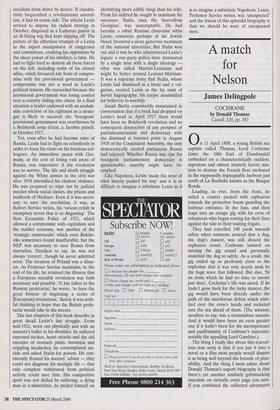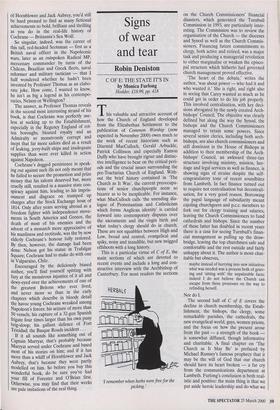A match for Nelson
James Delingpole
COCHRANE by Donald Thomas Cassell, £20, pp. 383 n 11 April 1809, a young British sea captain called Thomas, Lord Cochrane (later the 10th Earl of Dundonald) embarked on a characteristically reckless, ingenious and almost insanely heroic mis- 'sion to destroy the French fleet anchored in the supposedly impregnable harbour just south of La Rochelle known as the Basque Roads.
Leading, as ever, from the front, he sailed a coaster packed with explosives towards the protective boom guarding the harbour entrance, lit the fuse, and then leapt into an escape gig with his crew of volunteers who began rowing for their lives against the tide to their waiting frigate.
They had travelled 100 yards towards safety when someone noticed that a dog, the ship's mascot, was still aboard the explosion vessel. Cochrane insisted on turning the gig round and personally snatched the dog to safety. As a result, the gig ended up so perilously close to the explosion that it was very nearly sunk by the huge wave that followed. But also, 'by an irony which he had no time to savour just then', Cochrane's life was saved. If he hadn't gone back for the lucky mascot, the gig would have been directly under the path of the murderous debris which whis- tled over the crew's heads and rocketed into the sea ahead of them. (The mission, needless to say, was a tremendous success. And it would have been an even greater one if it hadn't been for the incompetence and pusillanimity of Cochrane's superiors, notably the appalling Lord Gambier.) The thing I really like about this marvel- lous true story is that if you put it into a novel or a film most people would dismiss it as being well beyond the bounds of plau- sibility. And the thing I most adore about Donald Thomas's superb biography is that there's yet another similarly gobsmacking anecdote on virtually every page you turn. If you combined the collected adventures of Hornblower and Jack Aubrey, you'd still be hard pressed to find as many fictional. achievements so bold, brilliant and thrilling as you do in the real-life history of Cochrane — Britannia's Sea Wolf.
So singular, indeed, was the career of this tall, red-headed Scotsman — first as a British naval officer in the Napoleonic wars, later as an outspoken Radical MP, mercenary commander by turns of the Chilean, Brazilian and Greek fleets, naval reformer and military tactician — that I half wondered whether he hadn't been invented by Professor Thomas as an elabo- rate joke. How come, I wanted to know, he isn't as big a legend as his contempo- raries, Nelson or Wellington?
The answer, as Professor Thomas reveals in the second most interesting strand of his book, is that Cochrane was perfectly use- less at sucking up to the Establishment, especially in the Regency England of rot- ten boroughs, bloated royalty and an Admiralty so monstrously corrupt and inept that far more sailors died as a result of leaking, jerry-built ships and inadequate supplies than were ever killed in action against Napoleon. Cochrane's dogged persistence in speak- ing out against such ills not only meant that he failed to secure the promotion and prize money that his talents deserved but, more cruelly still, resulted in a massive state con- spiracy against him, leading to his impris- onment and disgrace on trumped up charges after the Stock Exchange hoax of 1814. Only after years serving abroad as a freedom fighter with independence move- ments in South America and Greece, the death of most of his enemies and the advent of a monarch more appreciative of his manliness and rectitude, was the by now elderly Cochrane's honour fully restored. By then, however, the damage had been done: Nelson got his statue in Trafalgar Square; Cochrane had to make do with one in Valparaiso, Chile. Encouraged by the deliciously biased author, you'll find yourself spitting with fury at the monstrous injustice of it all and dewy-eyed over the achievements of one of the greatest Britons who ever lived, and never more so than in the early chapters which describe in bloody detail the havoc young Cochrane wreaked among Napoleon's forces: his seizure of more than 50 vessels; his capture of a 32-gun Spanish frigate four times larger than his own puny brig-sloop; his gallant defence of Fort Trinidad; the Basque Roads incident . . . If it all sounds like something out of Captain Marryat, that's probably because Marryat served under Cochrane and based most of his stories on him; and if it has more than a whiff of Hornblower and Jack Aubrey, that's because they were partly modelled on him. So before you buy this wonderful book, do be sure you've had Your fill of Forester and O'Brian first. Otherwise, you may find that their works are pale imitations of the real thing.



































































 Previous page
Previous page